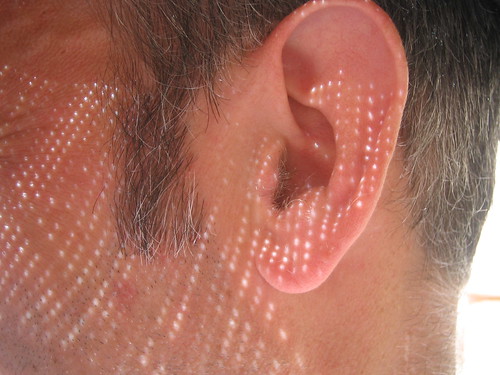TMJ and tinnitus may not seem linked at first glance. Temporomandibular Joint Disorder, often called TMJ or TMD, is stiffness, bite problems, a locked jaw, ear pain, clicking sounds and headaches. Tinnitus is a condition where a person hears a ringing in the ears.
What Causes TMJ?
The temporomandibular joint is located in the front of the ears on both sides of the head right where the lower jaw and the upper jaw meet. The upper jaw closes down on the lower jaw in part due to the moving parts within the temporomandibular joint. A person uses the temporomandibular joint many times throughout the day to yawn talk, bite and chew. When this joint is overused, a person can develop TMJ.
One of the most common causes of TMJ is teeth grinding or teeth clenching. These actions wear down the cartilage lining along the joint. A person may not be aware of the teeth grinding or teeth clenching because it may occur at night while sleeping, but he or she will typically feel pain in the ear or jaw in the morning upon waking. Excessive gum chewing and fingernail biting can also wear down the cartilage lining of the joint and cause TMJ.
Fractures in the facial bones or jaw, misalignment of the teeth and other dental issues can also lead to TMJ. These issues can make it difficult for a person to find a comfortable bite, causing stress on the TMJ.
What Causes Tinnitus?
Tinnitus can be caused by many things, and often times the cause of tinnitus is never determined. Many times, tinnitus is caused by damage to the inner ear cells. When the cells or tiny hairs in your inner ear are damaged, they can send random electrical impulses, which your brain interprets as ringing.
Tinnitus is often the result of age-related hearing loss in people 60 years of age and older. Tinnitus can also result from exposure to loud noises. People who are exposed to the heavy noises from chain saws, firearms, heavy equipment and even portable music devices can experience hearing loss and tinnitus. Earwax blockage, ear bone changes, Muniere’s disease, stress, depression, head injuries, neck injuries and acoustic neuromas can also cause tinnitus.
What is the Link Between Tinnitus and TMJ?
TMJ is another possible, but uncommon, cause of tinnitus. When a person tightens the temporomandibular joint, the small muscles in the middle of the ear may also tighten. This tightening of the ear’s muscles may cause some of thee ear’s important bones to tighten up and freeze, resulting in hearing issues. The pain from TMJ can cause hearing issues because the joint shares pathways with your hearing processes.TMJ and tinnitus may not seem linked at first glance. Temporomandibular Joint Disorder, often called TMJ or TMD, is stiffness, bite problems, a locked jaw, ear pain, clicking sounds and headaches. Tinnitus is a condition where a person hears a ringing in the ears.
What Causes TMJ?
The temporomandibular joint is located in the front of the ears on both sides of the head right where the lower jaw and the upper jaw meet. The upper jaw closes down on the lower jaw in part due to the moving parts within the temporomandibular joint. A person uses the temporomandibular joint many times throughout the day to yawn talk, bite and chew. When this joint is overused, a person can develop TMJ.
One of the most common causes of TMJ is teeth grinding or teeth clenching. These actions wear down the cartilage lining along the joint. A person may not be aware of the teeth grinding or teeth clenching because it may occur at night while sleeping, but he or she will typically feel pain in the ear or jaw in the morning upon waking. Excessive gum chewing and fingernail biting can also wear down the cartilage lining of the joint and cause TMJ.
Fractures in the facial bones or jaw, misalignment of the teeth and other dental issues can also lead to TMJ. These issues can make it difficult for a person to find a comfortable bite, causing stress on the TMJ.
What Causes Tinnitus?
Tinnitus can be caused by many things, and often times the cause of tinnitus is never determined. Many times, tinnitus is caused by damage to the inner ear cells. When the cells or tiny hairs in your inner ear are damaged, they can send random electrical impulses, which your brain interprets as ringing.
Tinnitus is often the result of age-related hearing loss in people 60 years of age and older. Tinnitus can also result from exposure to loud noises. People who are exposed to the heavy noises from chain saws, firearms, heavy equipment and even portable music devices can experience hearing loss and tinnitus. Earwax blockage, ear bone changes, Muniere’s disease, stress, depression, head injuries, neck injuries and acoustic neuromas can also cause tinnitus.
What is the Link Between Tinnitus and TMJ?
TMJ is another possible, but uncommon, cause of tinnitus. When a person tightens the temporomandibular joint, the small muscles in the middle of the ear may also tighten. This tightening of the ear’s muscles may cause some of thee ear’s important bones to tighten up and freeze, resulting in hearing issues. The pain from TMJ can cause hearing issues because the joint shares pathways with your hearing processes.

Peter Wendt has been writing and researching in his home state of Austin, Texas for several years. If you would like more information about TMJ, Wendt recommends visting orthodontics in Austin, TX.

